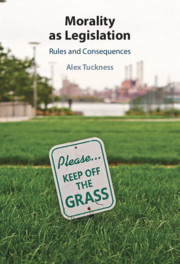Book contents
- Morality as Legislation
- Morality as Legislation
- Copyright page
- Dedication
- Contents
- Acknowledgments
- Abbreviations with Method of Citation
- Introduction
- Part I The Emergence of the Rule-Consequentialist Paradox
- Chapter 1 God and Consequences
- Chapter 2 Legislators, Architects, and Spectators
- Chapter 3 The Great Divide
- Chapter 4 Moral Expression as Legislation
- Chapter 5 Secular Heterodoxy
- Part II Contemporary Approaches to the Rule-Consequentialist Paradox
- Works Cited
- Index
Chapter 3 - The Great Divide
Bentham and Paley
from Part I - The Emergence of the Rule-Consequentialist Paradox
Published online by Cambridge University Press: 29 July 2021
- Morality as Legislation
- Morality as Legislation
- Copyright page
- Dedication
- Contents
- Acknowledgments
- Abbreviations with Method of Citation
- Introduction
- Part I The Emergence of the Rule-Consequentialist Paradox
- Chapter 1 God and Consequences
- Chapter 2 Legislators, Architects, and Spectators
- Chapter 3 The Great Divide
- Chapter 4 Moral Expression as Legislation
- Chapter 5 Secular Heterodoxy
- Part II Contemporary Approaches to the Rule-Consequentialist Paradox
- Works Cited
- Index
Summary
Chapter 3 examines the decisive break between religious and secular utilitarianism in the thought of William Paley and Jeremy Bentham. Paley, the better known and more widely respected thinker of the two at the time, is in many ways the paradigm case of the theological version of morality as legislation. Paley, like Locke, used human legislative deliberation as a paradigm of rationality for thinking about the content of the divine law. Bentham’s project must be understood in part as motivated by a desire to reject the theological assumptions of theories like Paley’s that stood in the way of radical reform. It also encouraged a reframing of moral expression as a kind of legislative act. Bentham saw reputational sanctions as one substitute for religious motives for moral action, but this also required a perspectival shift towards a legislative approach when making moral statements.
- Type
- Chapter
- Information
- Morality as LegislationRules and Consequences, pp. 83 - 100Publisher: Cambridge University PressPrint publication year: 2021



